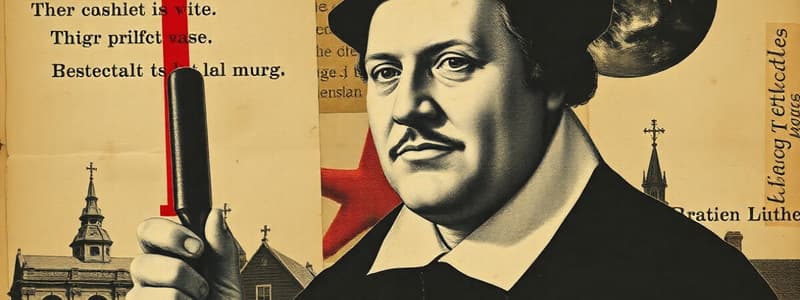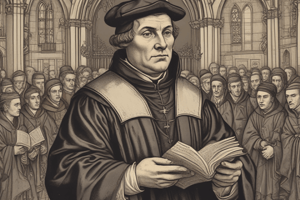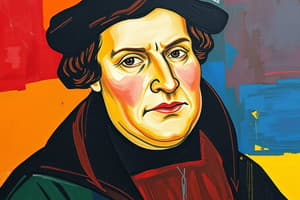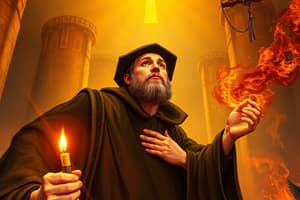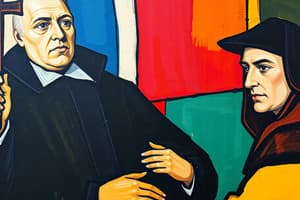Podcast
Questions and Answers
What was a major outcome of Martin Luther's translation of the Bible into German?
What was a major outcome of Martin Luther's translation of the Bible into German?
- It made the Bible more accessible to the common people. (correct)
- It helped standardize the German language. (correct)
- It decreased the importance of the Catholic Church.
- It led to increased illiteracy among the laity.
Why did Luther ultimately side with the nobility during the Peasants' War?
Why did Luther ultimately side with the nobility during the Peasants' War?
- He was in favor of keeping order and stability in society. (correct)
- He wanted to suppress the rebellion for his own safety.
- He believed in the noble class's divine right to rule.
- He felt that the peasants' interpretation of his theses was correct.
Which aspect of salvation did Luther emphasize in his doctrine?
Which aspect of salvation did Luther emphasize in his doctrine?
- Salvation is achieved through good works.
- Salvation is based on God's grace alone. (correct)
- Salvation can be bought through indulgences.
- Salvation is dependent on the authority of the pope.
What were indulgences used for during the Renaissance era?
What were indulgences used for during the Renaissance era?
In what way did Luther view priests in his vision of Christianity?
In what way did Luther view priests in his vision of Christianity?
What was Luther’s significant criticism of Catholic doctrine?
What was Luther’s significant criticism of Catholic doctrine?
How did Lutherans redefine their identity in the face of being labeled as Protestants?
How did Lutherans redefine their identity in the face of being labeled as Protestants?
What was one political consequence of the Protestant Reformation?
What was one political consequence of the Protestant Reformation?
What was the primary belief of Calvinism regarding salvation?
What was the primary belief of Calvinism regarding salvation?
How did the Protestant Reformation affect the relationship between Calvinists and Lutherans?
How did the Protestant Reformation affect the relationship between Calvinists and Lutherans?
What was one of the primary reasons for King Henry VIII's separation from the Catholic Church?
What was one of the primary reasons for King Henry VIII's separation from the Catholic Church?
What practice did Calvinists in Geneva establish to scrutinize citizens?
What practice did Calvinists in Geneva establish to scrutinize citizens?
What role did the Jesuits play during the Counter-Reformation?
What role did the Jesuits play during the Counter-Reformation?
What was a significant characteristic of the Calvinist view toward financial success?
What was a significant characteristic of the Calvinist view toward financial success?
What was the Council of Trent's main focus during its deliberations?
What was the Council of Trent's main focus during its deliberations?
What was the purpose of the Holy Office created during the Counter-Reformation?
What was the purpose of the Holy Office created during the Counter-Reformation?
Which term describes the Calvinist belief that free will is merely an illusion?
Which term describes the Calvinist belief that free will is merely an illusion?
What was one of the outcomes of King Henry VIII's Act of Supremacy?
What was one of the outcomes of King Henry VIII's Act of Supremacy?
Flashcards
Lutheran Doctrine: Sola Gratia
Lutheran Doctrine: Sola Gratia
The belief that salvation is achieved through God's grace alone, not through good works.
Indulgences
Indulgences
The practice of giving money to the Church in exchange for forgiveness of sins.
Purgatory
Purgatory
A period after death where souls are purified before entering Heaven.
Reformation
Reformation
Signup and view all the flashcards
Counter Reformation
Counter Reformation
Signup and view all the flashcards
Sola Scriptura
Sola Scriptura
Signup and view all the flashcards
Protestantism
Protestantism
Signup and view all the flashcards
Lutheranism
Lutheranism
Signup and view all the flashcards
Predestination
Predestination
Signup and view all the flashcards
Calvinism
Calvinism
Signup and view all the flashcards
Limited Free Will
Limited Free Will
Signup and view all the flashcards
Financial Success as a Sign of Election
Financial Success as a Sign of Election
Signup and view all the flashcards
Jesuits
Jesuits
Signup and view all the flashcards
English Reformation
English Reformation
Signup and view all the flashcards
Act of Supremacy
Act of Supremacy
Signup and view all the flashcards
Individual Interpretation of the Bible
Individual Interpretation of the Bible
Signup and view all the flashcards
Puritans
Puritans
Signup and view all the flashcards
Study Notes
Protestant Reformation and Counter-Reformation
- Martin Luther, a German religious reformer, challenged the Catholic Church. His Ninety-Five Theses, despite intended reform, sparked a rebellion, forcing him to align with nobility.
- Luther's translation of the Bible into German was highly influential.
- Luther's rebellion was significant compared to earlier heretic movements due to its success.
- Luther was a conservative figure, but peasant interpretations led to a conflict addressed with noble support.
- European trade competition influenced global events during this period.
- The Reformation represented a major split from the Catholic Church (following the initial split from the Orthodox Church).
- Catholic doctrines emphasized access through the Church, indulgences (absolution of sins), and purgatory (soul between heaven and hell).
- Indulgences, offered as enticements for crusades, were criticized for their practice by Luther.
- Church corruption amongst Renaissance Popes exacerbated criticisms.
- Lutheranism, the first successful break, led to the emerging term "Protestant," originally a derogatory label.
Lutheran Doctrine
- Lutherans diverged from the Catholic Church, challenging the notion of salvation through sacraments or good works as necessary for salvation.
- Luther believed salvation is solely through God's grace.
- Luther accepted baptism and communion as valid sacraments based on biblical precedent.
- Luther believed the priest is a guide, not a gatekeeper of spiritual authority.
- Luther advocated for direct access to the Bible for the laity.
Calvinism
- Calvinism emerged from Lutheranism, founded by John Calvin, a French lawyer who was exiled for Protestant ideals.
- Calvin's theology established a distinct Protestant denomination in Geneva.
- Calvinism espoused predestination, the belief that salvation or damnation is predetermined by God.
- Calvinists believed that outward piety, a dedicated life according to the Bible, and worldly success indicated God's favor (without guaranteeing salvation).
- Calvinists aimed to establish religious communities through strict standards.
- Calvinism spread to various regions including France (Huguenots), Scotland (Presbyterians), and North America (Puritans).
- A significant rivalry existed between Lutherans and Calvinists.
Anglicanism (English Reformation)
- The English Reformation stemmed from King Henry VIII's desire for a divorce, leading to his breakaway from the Catholic Church.
- The Act of Supremacy legally separated England from the Catholic Church and established the monarch as head of the Church of England.
- The Church of England retained many Catholic doctrines and rituals but differed in structure.
- Henry VIII seized Catholic Church properties.
Counter-Reformation
- The Catholic Church responded to Protestantism, initially with inactivity, yet individuals questioning the practices grew.
- Pope Paul III commissioned reports on potential reforms, but doctrinal changes were limited.
- The Holy Office (inquisition) was created to combat heresy.
- The Index of Forbidden Books was instituted to control access to religious material.
- The Council of Trent (1545-1563) addressed accusations against the Catholic Church.
- The Jesuits, a religious order led by Ignatius of Loyola, focused on reconverting Protestants to Catholicism.
Studying That Suits You
Use AI to generate personalized quizzes and flashcards to suit your learning preferences.
